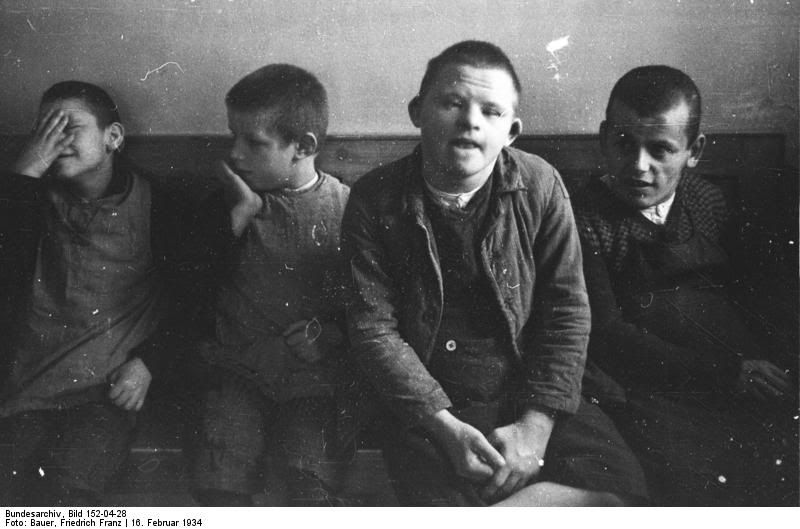
I guess the thing is, I love this picture, and I even considered posting it without saying what it was from, but that seemed creepy I guess. It is just rare to see such an old picture of disabled people, and they're such beautiful kids--I wish I could just keep this and look at it all the time without thinking about where they are and what happened to them later.

It is rather a sweet photo. I have developed a bit of an obsession with the history of institutions, and so I've actually seen quite a few photos of people with disabilities from a long time ago. If you have an interest, Burton Blatt has a couple of books, "Christmas in Purgatory" and "The Family Papers: A Return to Purgatory", with a lot of photographs of people who lived (and may still) live in institutions. Another book that has a small collection of photos is James Trent's "Inventing the Feeble Mind: A History of Mental Retardation n the United States".
ReplyDeleteWell, I did say I have a little bit of the obsession going on. It bothered me for a long time that I work at an institution (still does, but I've come to terms with it off and on over the past twenty-two years). I always want to know what it was like for the adults I work with when they were children. Any time I have an opportunity to see photos of them in their childhood I am quite thrilled. Sadly, I usually only get to see them if one of them passes away, and then it's only if they have family members who choose to share photos at their memorial services.
There's more I have to say, but this is your blog, and I don't want to break your brain.
Oh it's okay it was born broken. You can finish.
ReplyDelete:-) I think I forgot where I was headed with that giant rant. I'll have to ponder it again. It was probably mostly to say that I think it's sad that so many of my clients (who are all adults) don't have photos and albums from their childhood, because so many of them spent a lot of their childhood at the institution. There are definitely photos, but the folks whose pictures they are don't own them (own them in the sense of owning who you are and owning your history and the like).
ReplyDeleteI think photos (or someone having photos of you) also indicates in some way that you belong to a community/family and that someone cares about you, sees you as a person and wants to, in some way, be connected to you. When my clients had to leave their families to live in the institution, they also had to leave their sense of identity with family/community behind. Meaning, they no longer had the photos and memorabilia and possessions that connect them to who they started out being.
Okay, I guess I managed to get my rant back. :-) Thanks, Amanda! I feel better now.
I know this is none of my business but why do you work in an institution if it bothers you so much?
ReplyDeleteIt's a legitimate question. Well, for one thing, I needed a full-time job when I got out of school (and still do, given that I'm not independently wealthy). For another, I really like my clients a lot. As I said, I've come to terms with institutions in varying ways over the (many) years I've worked there. I can see that sometimes an institution is a safer place than home may have been. I've just never been pro-institution on principle. But I deal with some people who would literally die if they lived out in the community because they need such specialized care.
ReplyDeleteBottom line, though, is that I truly love the people I work with. My life would never have been as interesting and full of learning and craziness if I didn't work there. I love being a music therapist, and my clients deserve to have people who care about them and who want to grow and learn- just as someone who lives in the community deserves good services.
The fact that it pays too makes it all the better. I've said, for a long time, that I'd do my job for free if my earthly needs were taken care of.
I also committed myself long ago to working for my clients and not for the system within which they live. It's a matter of focus, I guess. I try not to focus on the parts that bother me, or I wouldn't be a particularly effective therapist.